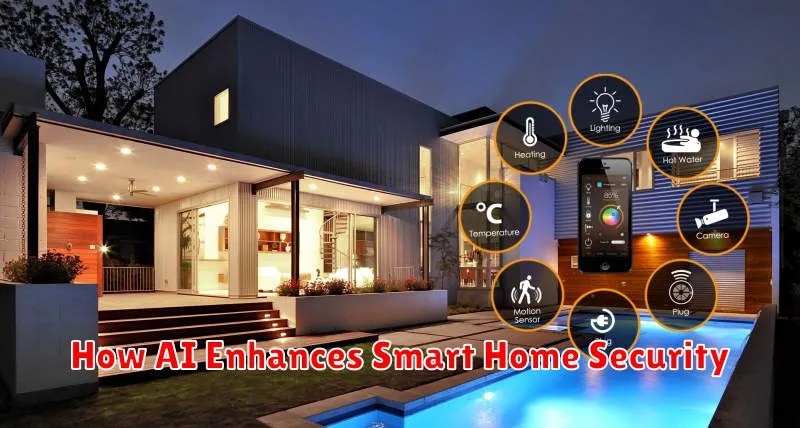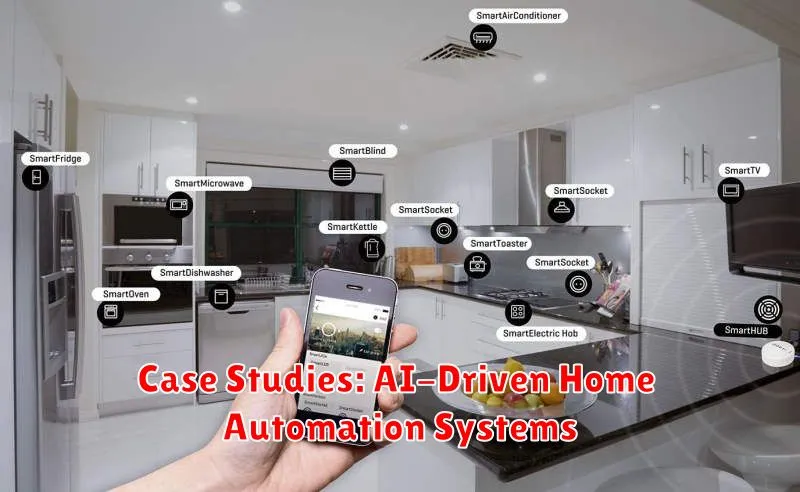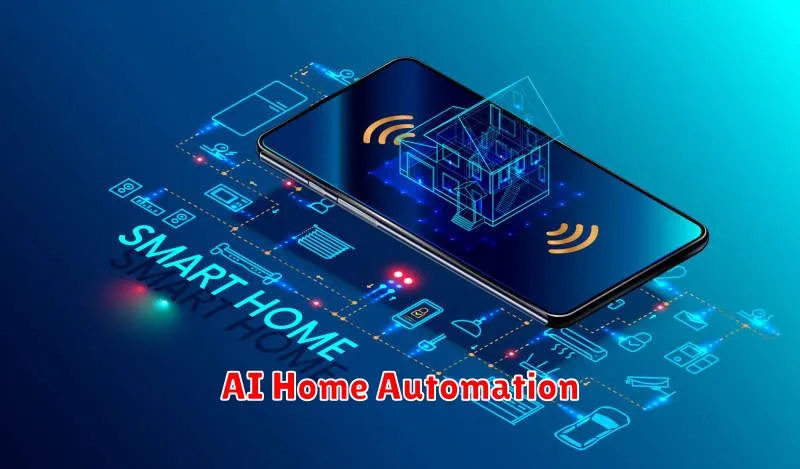In today’s fast-paced world, convenience and efficiency are highly sought after. Home automation systems have emerged as a game-changer, offering residents a seamless and intelligent living experience. At the heart of these systems lies artificial intelligence (AI), revolutionizing the way we interact with our homes. From controlling appliances to enhancing security, AI is transforming home automation systems into intuitive and personalized hubs.
The integration of AI brings a plethora of benefits to home automation. Smart home devices powered by AI algorithms can learn your routines and preferences, adapting to your lifestyle for maximum comfort and efficiency. Imagine your lights dimming automatically at sunset, your thermostat adjusting based on your schedule, and your entertainment system playing your favorite music with just a voice command. This is the reality AI is bringing to home automation, creating a connected and responsive environment that caters to your every need.
How AI Enhances Smart Home Security

Artificial intelligence (AI) is revolutionizing the way we secure our homes. AI-powered smart home security systems offer advanced features that traditional systems lack, enhancing safety and peace of mind.
One of the most significant ways AI enhances smart home security is through proactive threat detection. AI algorithms analyze data from various sources, including cameras, sensors, and smart devices, to identify potential threats in real-time. This allows for early warnings and swift responses, preventing incidents before they escalate.
Another key benefit is personalized security. AI systems learn your daily routines and habits, recognizing normal patterns and identifying anomalies. This enables them to differentiate between genuine threats and false alarms, reducing unnecessary alerts and ensuring you’re alerted only when truly necessary.
AI also plays a crucial role in remote monitoring and control. With AI-powered apps, you can remotely monitor your home’s security status, receive alerts, and even control your security system from anywhere. This empowers you to react quickly to potential threats and safeguard your property regardless of your location.
Furthermore, AI enables smart home automation, integrating security systems with other home appliances and devices. This allows for automated responses to security threats, such as locking doors, turning on lights, or triggering alarms, enhancing security and convenience.
In conclusion, AI is transforming smart home security, offering enhanced threat detection, personalized security, remote monitoring and control, and smart home automation. With these advanced features, AI-powered systems provide a more proactive, intelligent, and efficient way to safeguard your home and loved ones.
AI-Powered Home Automation: What You Need to Know
Home automation has come a long way, and with the rise of artificial intelligence (AI), it’s becoming even more sophisticated and intuitive. AI-powered home automation systems are transforming the way we live, offering unparalleled convenience, comfort, and energy efficiency. Here’s what you need to know about this exciting technology.
AI’s role in home automation is multifaceted. It enables devices to learn your preferences, adapt to your routines, and anticipate your needs. For example, your AI-powered thermostat can learn your preferred temperature settings and automatically adjust them based on your schedule and the weather. It can also detect your presence and turn on the lights as you enter a room.
Key benefits of AI-powered home automation include:
- Increased convenience: Control your appliances, lighting, and security systems with voice commands or smartphone apps.
- Enhanced security: AI-powered security systems can detect unusual activity and alert you or the authorities.
- Energy efficiency: AI can optimize energy consumption by automatically adjusting your HVAC system, lighting, and appliances based on your usage patterns.
- Personalized experiences: Your home can learn your habits and preferences, tailoring itself to your needs and making your life easier.
While AI-powered home automation offers many benefits, it’s important to consider the potential challenges:
- Privacy concerns: AI systems collect data about your habits and preferences. Ensure your data is protected and used responsibly.
- Security vulnerabilities: Like any connected device, AI-powered home automation systems can be vulnerable to hacking. Invest in robust security measures.
- Cost: AI-powered home automation systems can be more expensive than traditional systems.
Overall, AI-powered home automation is a game-changer for homeowners. As the technology continues to evolve, we can expect even more innovative features and benefits. If you’re looking for ways to enhance your home and simplify your life, AI-powered home automation is worth considering.
The Benefits of AI in Energy Management
Artificial intelligence (AI) is rapidly transforming various industries, and home automation is no exception. AI-powered systems offer significant benefits in energy management, helping homeowners optimize energy consumption, reduce costs, and contribute to a more sustainable future.
One of the key benefits of AI in energy management is real-time monitoring and analysis. AI algorithms can continuously collect data from various sources, such as smart meters, thermostats, and appliances. This data can be analyzed to identify patterns and trends in energy usage, providing insights into areas where energy consumption can be optimized.
AI-powered systems can also implement predictive analytics to anticipate energy needs based on historical data and external factors like weather conditions. This allows for proactive energy management, ensuring that energy is only used when needed. For example, AI can adjust thermostat settings, switch off unused appliances, and optimize charging schedules for electric vehicles based on predicted energy demand.
Furthermore, AI can facilitate energy optimization by recommending personalized energy-saving tips and strategies. By analyzing individual usage patterns, AI systems can identify opportunities for reducing energy waste, such as suggesting more efficient appliances or recommending alternative heating and cooling methods.
In conclusion, AI plays a pivotal role in enhancing home automation systems by offering significant benefits in energy management. From real-time monitoring and analysis to predictive analytics and personalized energy-saving recommendations, AI empowers homeowners to optimize energy consumption, reduce costs, and live more sustainably.
Integrating AI with Voice Assistants
The integration of AI with voice assistants is revolutionizing home automation systems, enhancing convenience, personalization, and efficiency. Voice assistants powered by AI algorithms can understand natural language, learn user preferences, and automate tasks based on context and routine. This integration allows users to control their homes with simple voice commands, making life more effortless.
AI-powered voice assistants can perform various tasks, such as controlling lights, thermostats, and appliances, playing music, setting reminders, and even providing information and news updates. They continuously learn and adapt to user preferences, becoming more personalized and responsive over time.
For example, an AI-powered voice assistant can learn your preferred temperature and automatically adjust the thermostat when you wake up or come home. It can also predict your needs based on your schedule, such as turning on the coffee maker in the morning or dimming the lights in the evening. This level of proactive automation enhances convenience and improves the overall living experience.
Furthermore, AI integration enhances the capabilities of voice assistants by enabling them to understand and respond to complex requests. Users can ask more nuanced questions or give more detailed commands, leading to a more intuitive and personalized experience. For instance, instead of saying “play music,” you can ask “play my favorite jazz playlist from the 1960s,” and the AI-powered voice assistant will understand and execute the command.
The Future of AI in Home Automation
Artificial intelligence (AI) is rapidly transforming the way we live, and home automation is no exception. AI-powered devices and systems are making homes more convenient, efficient, and secure. As AI technology continues to advance, the future of home automation promises to be even more exciting and transformative.
One of the most significant impacts of AI on home automation will be in the area of personalization. AI algorithms can learn individual preferences and habits, allowing home automation systems to tailor their functionality to meet specific needs. This could include adjusting lighting and temperature based on user schedules, recommending entertainment options based on past preferences, and even anticipating and fulfilling daily routines.
Another key area where AI will revolutionize home automation is proactive maintenance. AI-powered systems can monitor the performance of home appliances and systems, detecting potential problems before they become serious issues. This can help to prevent costly repairs, improve energy efficiency, and extend the lifespan of home assets.
The future of AI in home automation is not without its challenges. Concerns regarding privacy and security must be addressed to ensure that AI-powered systems are used responsibly and ethically. However, the potential benefits of AI in home automation are undeniable. As AI technology continues to evolve, we can expect to see even more innovative and transformative applications in the years to come.
Case Studies: AI-Driven Home Automation Systems

AI is rapidly transforming the home automation landscape, offering a new level of personalization, efficiency, and convenience. Let’s explore some compelling case studies showcasing the power of AI-driven home automation systems:
Nest Learning Thermostat: This iconic device utilizes AI to learn your heating and cooling preferences, creating personalized schedules and optimizing energy consumption. Through machine learning, the thermostat continuously adapts to your routine, ensuring optimal comfort while reducing energy bills.
Amazon Alexa and Google Assistant: These voice assistants have evolved beyond basic commands. By leveraging natural language processing (NLP) and AI, they can understand context, anticipate your needs, and even proactively suggest actions. For example, Alexa might remind you to buy groceries based on your usual shopping patterns or suggest a new recipe based on your recent meal preferences.
Smart Security Systems: AI-powered security cameras can analyze footage to distinguish between threats and benign activity. They can learn your typical routines and notify you of unusual activity, reducing false alarms and improving response times. Some systems even utilize facial recognition to personalize security settings for different family members.
AI-Powered Lighting: Smart lighting systems leverage AI to create dynamic lighting scenarios based on your mood, activity, and even the weather. They can automatically adjust brightness levels throughout the day, mimicking natural sunlight and creating a more comfortable and stimulating environment.
Smart Appliances: AI is making kitchen appliances smarter, allowing them to learn your cooking habits, optimize energy consumption, and even provide personalized recommendations. For example, a smart refrigerator might suggest recipes based on the ingredients you have on hand or alert you to expiring items.
These case studies demonstrate the transformative potential of AI in home automation. As AI continues to evolve, we can expect even more personalized, intuitive, and seamless home automation experiences, further enhancing our comfort, efficiency, and security.

